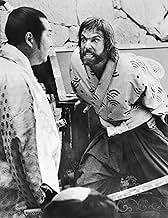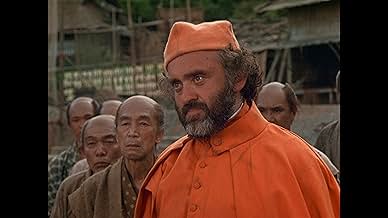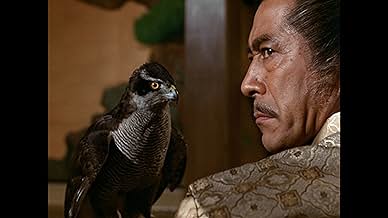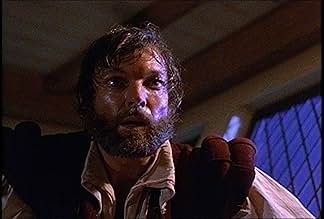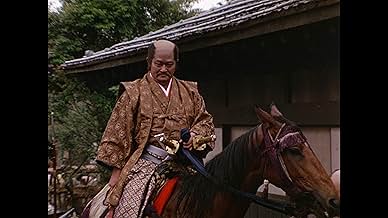Un navegante inglés se convierte a la vez en jugador y peón en los complejos juegos políticos del Japón feudal.Un navegante inglés se convierte a la vez en jugador y peón en los complejos juegos políticos del Japón feudal.Un navegante inglés se convierte a la vez en jugador y peón en los complejos juegos políticos del Japón feudal.
- Ganó 3 premios Primetime Emmy
- 8 premios ganados y 13 nominaciones en total
Explorar episodios
Opiniones destacadas
Any movie with this magnificent actor even showing up in a cameo, I give a 10. Actually, the costumes weren't very good, & a lot of the true historical facts were sometimes a little silly, but Toshiro Mifune makes the movie a classic. He's elemental, a force of nature, fantastic. Watch it just to get a glimpse of this wonderful actor's presence & charisma. The movie is based on the book by Clavell, & he did write the part of Toranaga with Toshiro in mind. The movie does follow the book pretty closely, and the book is based very loosely on an Englishman who was stranded on the Japanese Islands in the early 1600's.All-in-all, the movie on DVD is a lot better than the previous video tape that was out.
The MiniSeries Shogun is my all time favorite program. It is a romantisied account of the adventures of the first Englishman to reach Japan. The main character John Blackthorne is based on the real life person William Adams who was the only non Japanese ever to become a samurai. He was also a feudal lord in Japan ( called a Daimyo ) and the first Admiral of the Japanese Navy.
The acting is excellent and something which I found interesting and unusual about this series is that one of the ways that the movie uses to put you into the mind of the main character is that as he doesn't know any Japanese when he arrives there are no subtitles when the characters are speaking Japanese.
As I said earlier my all time favorite program and one I wish could be seen by more people more often. I did buy the series.
The acting is excellent and something which I found interesting and unusual about this series is that one of the ways that the movie uses to put you into the mind of the main character is that as he doesn't know any Japanese when he arrives there are no subtitles when the characters are speaking Japanese.
As I said earlier my all time favorite program and one I wish could be seen by more people more often. I did buy the series.
I first saw the mini-series on TV when it came out. I was like millions of other viewers who made sure they were home night after night to see this epic. Now that it's out on DVD, how could I resist? Seeing it on a much bigger screen than existed in the early 80's, I immediately was appalled by the bad hair pieces of almost all of the Japanese actors. It took a while to get used to the seams and wrinkled skullcaps and the makeup that didn't really match. The only other "ouch" moment, for me, came in the opening shot of the "Erasmus" being filmed from a helicopter with Orson Welles narration. It was impressive up until the helicopter shadow goes right over the boat and the water!..... I was amazed that wasn't edited out in post. Ah well. When you watch the bonus material, you get an idea of what a monumentally difficult project this was from the language and custom difficulties to the famous TOHO Studios being about 25 years behind the times with their equipment...not to mention the tank where the shipwreck was filmed. I don't know if I agree with the director and producers that if it wasn't for 'Shogun' sushi would not be as popular in the U.S. as it has become, but it certainly sparked an ongoing interest in Japanese history and culture in me. It will always be one of the crowning achievements for television. It's a miracle that it came off as beautifully as it did. Just don't watch the 2-hour mess that is on video.
There was a time in TV when the mini-series was king. They were great prestige products for the networks who, risking immense financial expenditure, hoped to create a cinematic masterpiece on a small screen.
SHOGUN may be the ultimate expression of this neglected TV format. Based on James Clavell's sweeping epic novel of the same name, it succeeds fully in transporting the viewer to another time and place. Through John Blackthorne's eyes (Richard Chamberlain in a now iconic performance, blending moments of delightful scenery chewing with moments of genuine emotion and subtlety), we become ever more involved in the political dealings of the Japanese nobility and the mixed motives of the Jesuits.
One of the great triumphs of SHOGUN is to ensnare the viewer despite long segments in Japanese with no subtitles. The filmmakers were trying to tell the story through Blackthorne's eyes and save for a few moments of narration explaining the dialog, we are left to slowly comprehend the action at the same pace as Blackthorne. It's a device which works wonderfully well, leaving the viewer to figure out what's going on through context and character.
In addition to Chamberlain, SHOGUN is replete with glorious performances. Toshiro Mifune's Toranaga, a Japanese nobleman with grand political designs, possesses great power and yet Mifune's performance is also very nuanced. Toranaga is a man who's mind is always trying to figure three steps ahead and we see this aspect of Toranaga's personality in Mifune's work- a considerable feat considering his dialog is exclusively in Japanese and without subtitles.
Yoko Shimada plays Mariko with a captivating beauty and ethereal grace. Becoming Blackthorne's interpreter and love interest, we cannot take our eyes off of her. Her performance is made doubly impressive by the fact that Ms. Shimada spoke no English and had to be told what her lines met with great care.
Additionally, John-Rhys Davies gives a wonderfully bravura turn as Rodrigues and Damien Thomas gives his Father Alvito real depth and dignity.
SHOGUN does show its age. The quality of the video image does have a bit of that TV glow to it and Maurice Jarre's score, seeming so lush back in 1980, sounds as if it were recorded by a very small third-rate band in a backwater recording studio- it reeks of TV. Still, these are comparatively minor quibbles to an otherwise completely engrossing epic. SHOGUN succeeds mightily in taking the viewer into a strange land filled with wonder and intrigue. By the end, it's a land you aren't ready to leave- perhaps the ultimate compliment for any film.
SHOGUN may be the ultimate expression of this neglected TV format. Based on James Clavell's sweeping epic novel of the same name, it succeeds fully in transporting the viewer to another time and place. Through John Blackthorne's eyes (Richard Chamberlain in a now iconic performance, blending moments of delightful scenery chewing with moments of genuine emotion and subtlety), we become ever more involved in the political dealings of the Japanese nobility and the mixed motives of the Jesuits.
One of the great triumphs of SHOGUN is to ensnare the viewer despite long segments in Japanese with no subtitles. The filmmakers were trying to tell the story through Blackthorne's eyes and save for a few moments of narration explaining the dialog, we are left to slowly comprehend the action at the same pace as Blackthorne. It's a device which works wonderfully well, leaving the viewer to figure out what's going on through context and character.
In addition to Chamberlain, SHOGUN is replete with glorious performances. Toshiro Mifune's Toranaga, a Japanese nobleman with grand political designs, possesses great power and yet Mifune's performance is also very nuanced. Toranaga is a man who's mind is always trying to figure three steps ahead and we see this aspect of Toranaga's personality in Mifune's work- a considerable feat considering his dialog is exclusively in Japanese and without subtitles.
Yoko Shimada plays Mariko with a captivating beauty and ethereal grace. Becoming Blackthorne's interpreter and love interest, we cannot take our eyes off of her. Her performance is made doubly impressive by the fact that Ms. Shimada spoke no English and had to be told what her lines met with great care.
Additionally, John-Rhys Davies gives a wonderfully bravura turn as Rodrigues and Damien Thomas gives his Father Alvito real depth and dignity.
SHOGUN does show its age. The quality of the video image does have a bit of that TV glow to it and Maurice Jarre's score, seeming so lush back in 1980, sounds as if it were recorded by a very small third-rate band in a backwater recording studio- it reeks of TV. Still, these are comparatively minor quibbles to an otherwise completely engrossing epic. SHOGUN succeeds mightily in taking the viewer into a strange land filled with wonder and intrigue. By the end, it's a land you aren't ready to leave- perhaps the ultimate compliment for any film.
Shogun is the story of an English pilot shipwrecked in Japan and the first Englishman to arrive there. The story is based fairly closely on the life of William Adams to whom most of the events in the film happened to and did in fact become the only non japanese ever to become a samauri. He also became a minor daimyo and Japan's first Admiral. He may have well been a deciding factor in tiping the balance of power that let the Shogunate become as powerful as it did to rule as long as it did. One of my favourite things about the story on video is that it is about half english and half japanese. With no subtitles. As John Blackthorne (the name given the main character in the story) is struggling with the japanese so is the viewer. (I have also used it to help improve my japanese which is very limited).
The story is fast moving and fasinating. I read the book in three days and couldn't wait for the mini-series if I have an entire day to relax I will sometimes watch the entire 549 minutes of the show. As I said it is my all time favourite program
The story is fast moving and fasinating. I read the book in three days and couldn't wait for the mini-series if I have an entire day to relax I will sometimes watch the entire 549 minutes of the show. As I said it is my all time favourite program
¿Sabías que…?
- TriviaWill Adams, the real-life English sea captain and adventurer who made it to Japan in the 16th century, has a street named after him in Japan: Anjin-Cho.
- ErroresAnjin-san receives a flintlock pistol as a gift from Lord Toranaga. Flintlock pistols were not in wide use until 1630, thirty years after the show's setting. The wheel lock and match lock pistols and muskets, also used in the show, are correct. Additionally, the Europeans were reluctant to export the latest firearms to Japan, preferring to keep the superior weaponry to themselves.
- Citas
[after Blackthorne's guard prevented an assassination attempt by Rodrigues]
Pilot-Major John Blackthorne: Captain Yoshinaka was right to search him. Was that your idea?
Lady Toda Buntaro - Mariko: Please excuse me, but I was afraid for you.
Pilot-Major John Blackthorne: Sad, isn't it? Not being able to trust anyone.
Lady Toda Buntaro - Mariko: It is not sad, Anjin-san. It is just one of life's most important rules.
- Versiones alternativasOriginally a twelve-hour TV miniseries narrated by Orson Welles, it was later reissued for television in a somewhat shortened version with narration by Anne Bancroft. Shogun was re-edited into a 125-minutes movie for USA network TV with the addition of a new voice over narrated by Orson Welles
- ConexionesEdited into Shogun (1980)
- Bandas sonorasBLACKTHORNE'S SHANTY
Words and Music by Eric Bercovici
Selecciones populares
Inicia sesión para calificar y agrega a la lista de videos para obtener recomendaciones personalizadas
- How many seasons does Shogun have?Con tecnología de Alexa
Detalles
- Fecha de lanzamiento
- Países de origen
- Idiomas
- También se conoce como
- James Clavell's Shogun
- Locaciones de filmación
- Productoras
- Ver más créditos de la compañía en IMDbPro
Contribuir a esta página
Sugiere una edición o agrega el contenido que falta


